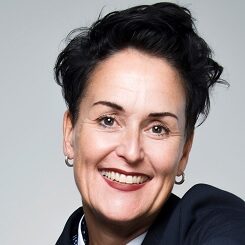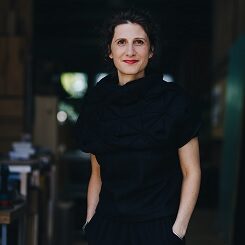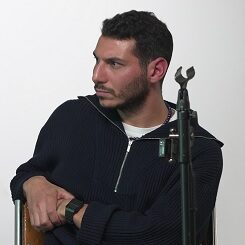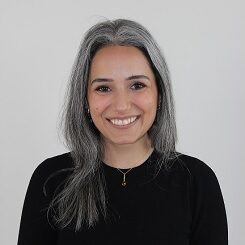Lebanese Designers at Dutch Design Week 2022: “From Beirut: Lebanese Design, Global Stories”
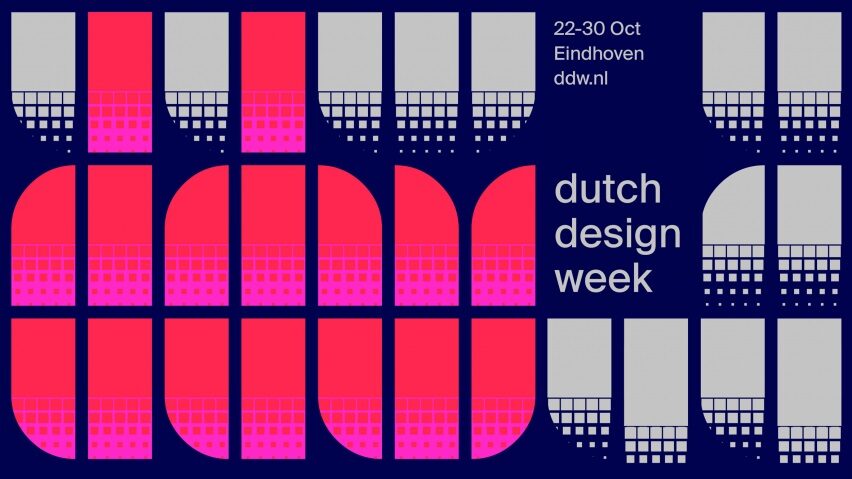
About the exhibition
As an initiative to push the Lebanese design scene into new and exciting territories, and as motivation for our local creatives following the economic and financial hardships they have endured, the Goethe-Institut through its project FANTASMEEM teamed up with the Diwan of Culture, Design and Innovation (DCDI) and Project4200 in the Netherlands to present Lebanese creatives with the chance to participate in Dutch Design Week 2022 which took place in Eindhoven in the Netherlands from 22 - 30 October 2022.
A total of 12 designers and design organizations have been selected by an international jury after having applied to an open call to exhibit their designs.
This project was a first! Initiated by Project4200, facilitated by DCDI and sponsored by FANTASMEEM, it was the first time that Lebanese designers and Lebanon as a country were represented in Dutch Design Week, the most important and competitive design exhibition in Northern Europe.
Given the very multi-layered challenges in Lebanon, it is essential for Lebanese designers to have visibility abroad and gain access to foreign markets. The project also aimed to shed a positive light on Lebanon as a design and innovation hub, when otherwise mostly affiliated with negative headlines. Our collective aim was to bring back Beirut as the creative Hub of the Middle East, positioning the designers in a situation of strength rather than weakness and showing the true potential of our creatives.
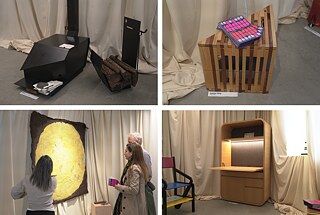
About the designers
The jury selected 12 designers to participate at Dutch Design Week:
- 1 percent architects with two products: Kapsul 1.0 & Chaise Escabeau
- Adrian Pepe with two products: Braided Series & Solar Cycles
- Chrystele Karam with Moonstruck Terrazzo
- Etienne Bastormagi and Nada Borgi with their Series M mirror
- MAD architecture and design with Stouff
- Marie-Anne Wehbeh with her marbled scarves
- Nour Kays with her recycled plastic Tapestry
- Shirine Sbaity with her Unison Stools
- Twig Collaborative with two products: Twig Kit & Modular Kit
- Bits to Atoms with three products: Abnormal Couch, Cigarette Lantern, Tripod maxi
- House of Today with a selection from their designer collection: Alya Tannous, Marc Dibeh, Kamal Aoun, Layal Chakar, Vrouyr Joubanian
About the implementation
The event was a big success. We received more than 1000 visitors during our 9 days stay at Megawatt Agency in Eindhoven. A lot of the visitors were very interested and impressed with the Lebanese level of production, manufacturing and craftsmanship. We were asked several times to walk them through the exhibition and explain about every single piece on display. We heard a lot of positive feedback on not only the designs presented but also on the fact that we brought all of these diverse designs together under one roof and in one collective and inclusive exhibition. Hearing that comment during the event further solidified our mission in pushing forward Lebanese designs to be discovered in new frontiers.
During the event, several of the designers visited and stood next to their work. They were approached by visitors and potential buyers. They also had the opportunity to go out and explore Eindhoven as well as other participating designers. From those experiences, several designers formed new connections, relationships and potential collaborations with new people they had met.

About the panel
In cooperation with the Goethe- Institut Netherlands and in an aim to encourage and foster exchange between the Dutch and Lebanese culture, we hosted a panel discussion that involved designers and active participants from both countries who discussed cultural exchange and participation, the Lebanese current situation and the creative solutions that the designers have come up with to endure it, and possible future scenarios for collaboration.
Our project’s social impact rightfully positioned the Lebanese designers in a situation of strength and inspiration despite the unfortunate circumstances they continue to face in Lebanon.
The panel discussion took place on the 24th of October at Kazerne in Eindhoven, where around 40 guests attended the event. It was moderated by Saskia van Stein. The panelists were Siba Sahabi, Rawad Baaklini and Jana Aridi.
The panel started with each of the panelists introducing themselves and their work. Rawad presented an overview about Lebanese design which was very interesting and created a starting point into the meaning of Design and storytelling as well as the common ground between design from different countries. The panel also discussed differences in practices and more importantly, the importance of inclusivity and diversity on an organizational level.
At the end of the panel, the attendants were interested in asking all sorts of questions to the panelists as well as the moderator. The panel ended on an open note with a lot to think about in terms of how we can make the design world more inclusive?
Saskia van Stein is an independent curator, moderator, and educator with an emphasis on design and architecture. Since 2019 she’s headmaster of the MA entitled “The Critical Inquiry Lab”, a department with artistic (design) research at its core. The course provides an environment for the development of a design practice understood as a cultural signifier and an agent of change. She was Director at Bureau Europa, platform for architecture and design, in Maastricht (2013–2019). Van Stein worked as a curator at the Netherlands Architecture Institute (now Het Nieuwe Instituut) in Rotterdam (2003–2012). She contributes to the development of cultural discourse, and she’s a board member of multiple advisory committees, involved in the several juries and advisory bodies such as The Independent School for the City and the architectural peer to peer review journal OASE.
Siba Sahabi is a German-Iranian interdisciplinary artist. In addition to objects and sculptures she creates theatre sets and installations for buildings and public spaces. Her award-winning work has been exhibited internationally in museums and galleries such as Museo Nacional de Bellas Artes in Buenos Aires and Saatchi Gallery in London. Through her work she explores and reconstructs the meaning of cultural identity. Sahabi is interested in how relationships around us determine who we are as individuals in our community, and how this ‘mould’ of our cultural identity changes when we are exposed to multiple cultures at the same time.
Rawad Baaklini is a Lebanese curator and designer based in Rotterdam. He worked with various curatorial teams in institutions like the Science Gallery network, the Noorderlicht Photo Festival of Groningen and the MIT Museum in Boston... He also taught at the Willem de Kooning Academy in Rotterdam as an audiovisual tutor, and is currently a thesis advisor and mentor at the Gerrit Rietveld Academy of Amsterdam. In his personal practice he explores the meeting points between the enigmatic concepts of design theory and the concrete reality of the everyday, with a particular interest in the mediums of film and performance.
Jana Aridi is a designer based in The Hague. Sensitive and culturally- relevant, her work draws on embodied sensorial experiences with materiality and nature in their multiple attributes. In 2021, she established Project4200, an agent for design throughout history and across continents. Her aim is to draw connections between design practices and styles across cultures as well as promoting design products from around the world.
Since 2019, she has been working with Goethe-Institut Libanon on the curation of design related events and workshops, the latest of which is establishing a support structure for the design scene in Lebanon, as well as bridging her work in Lebanon to Project4200 by creating the first exhibition for Lebanese designers in the Netherlands at Dutch Design Week 2022.
